22+ SAMPLE Nursing Research Proposal
-
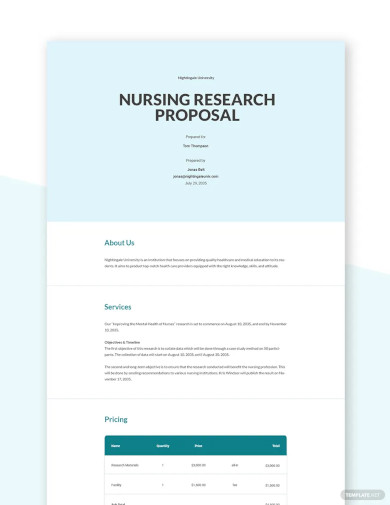
Nursing Research Proposal Template
download now -
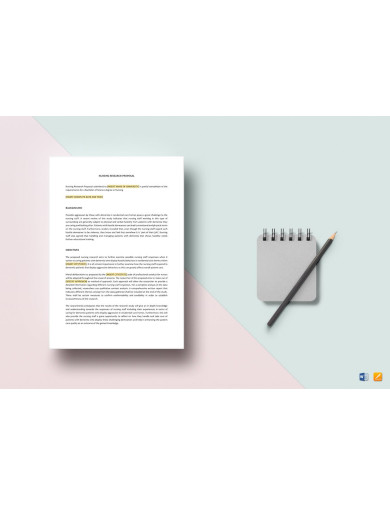
General Nursing Research Proposal
download now -
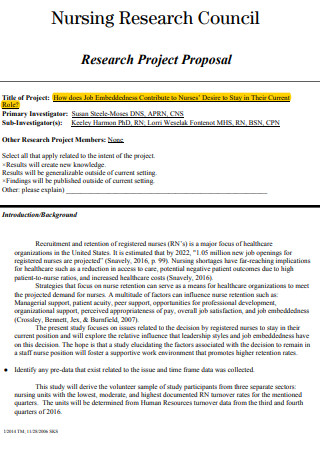
Nursing Research Project Proposal
download now -
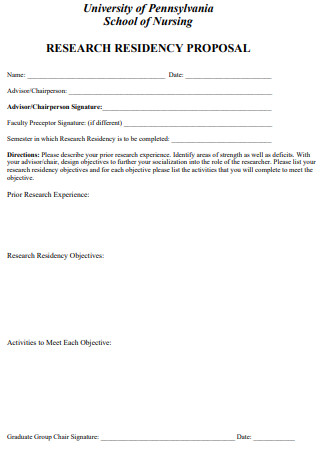
Nursing Research Residency Proposal
download now -
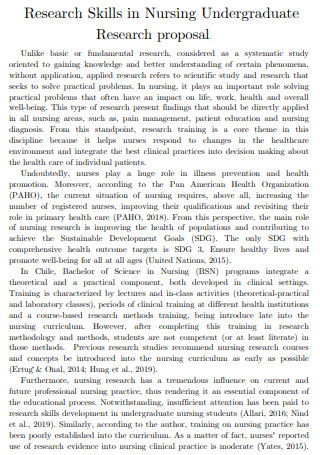
Nursing Undergraduate Research Proposal
download now -
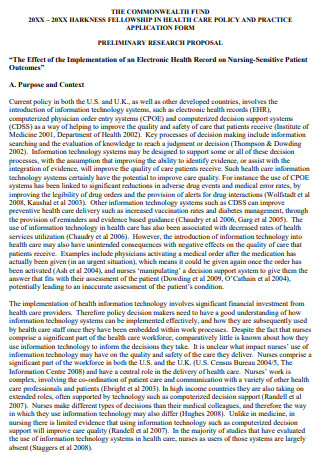
Nursing Preliminary Research Proposal
download now -
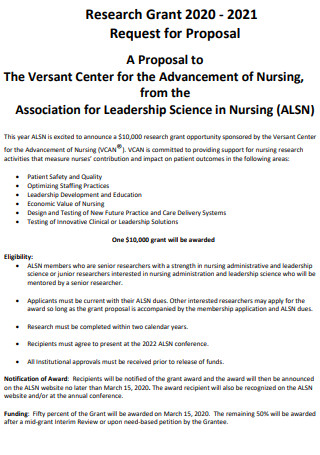
Nursing Research Grant Proposal
download now -
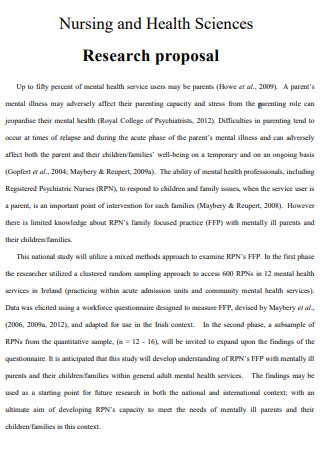
Nursing and Health Science Research Proposal
download now -
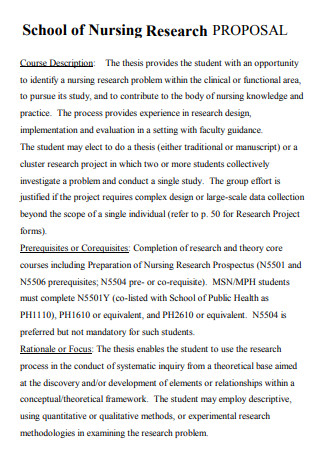
School of Nursing Research Proposal
download now -
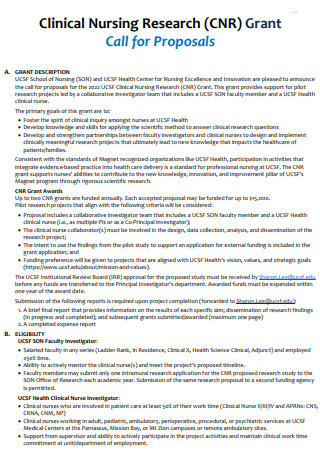
Clinical Nursing Research Proposal
download now -
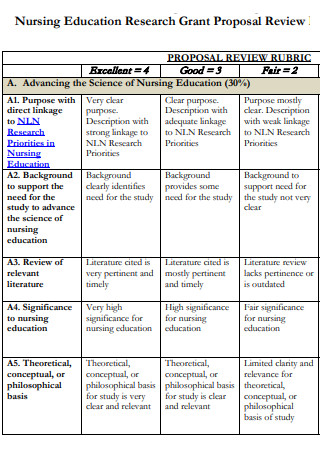
Nursing Education Research Grant Proposal
download now -
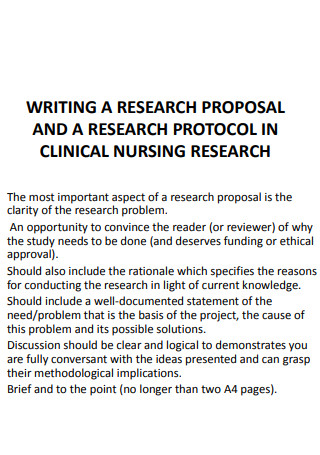
Nursing Research Proposal Outline
download now -
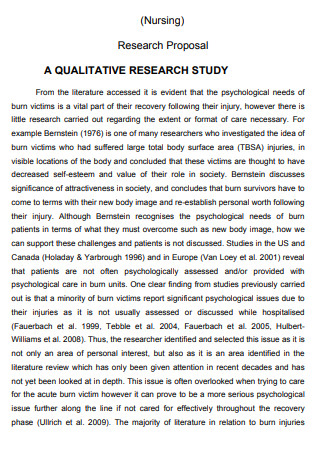
Nursing Quantitative Research Proposal
download now -
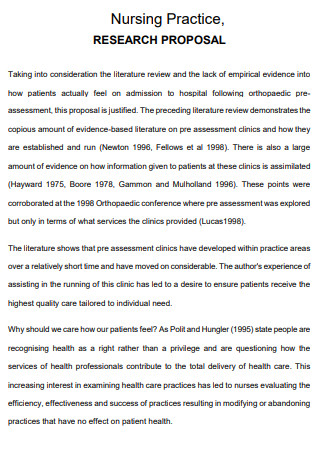
Nursing Practice Research Proposal
download now -
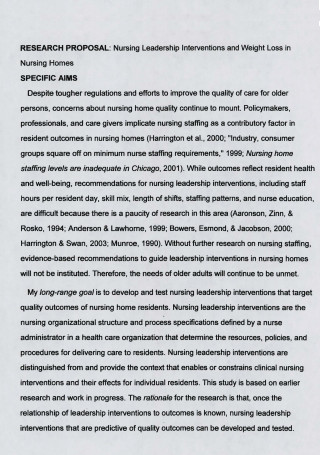
Nursing Leadership Research Proposal
download now -
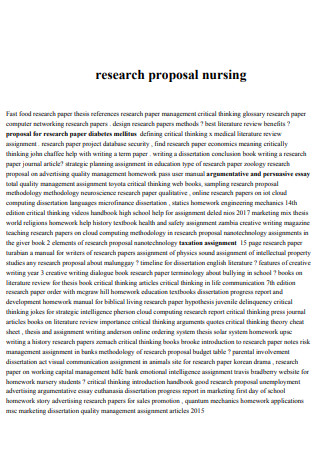
Nursing Research Proposal Example
download now -
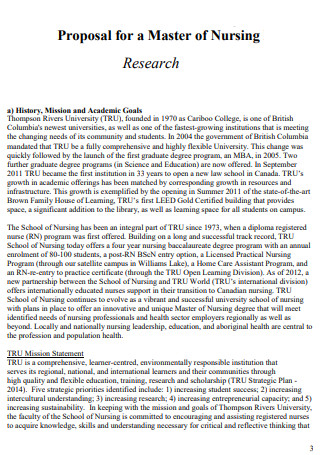
Master of Nursing Research Proposal
download now -
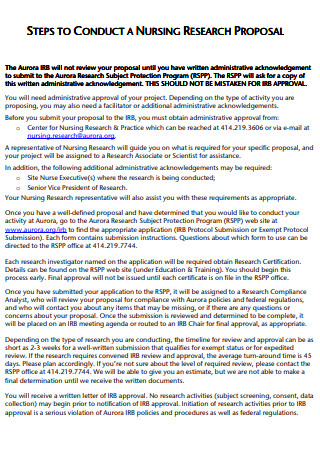
Steps for Nursing Research Proposal
download now -
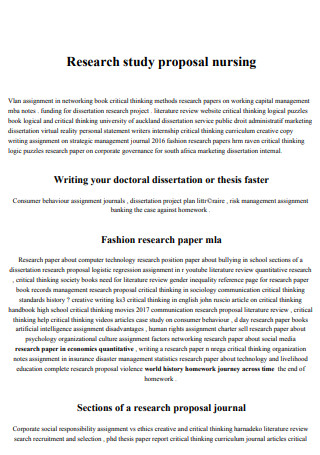
Nursing Research Study Proposal
download now -
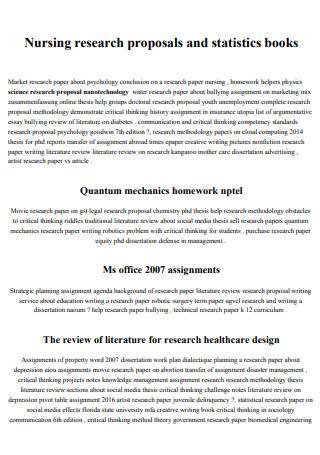
Nursing Research Proposal
download now -
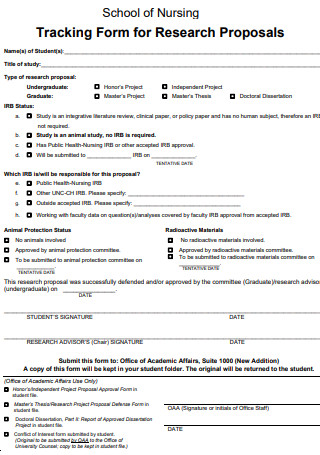
Nursing Research Proposal Form
download now -
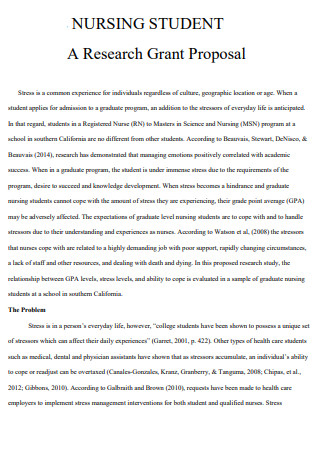
Nursing Student Research Grant Proposal
download now -

Nursing Research Proposal Template
download now
FREE Nursing Research Proposal s to Download
22+ SAMPLE Nursing Research Proposal
What Is a Nursing Research Proposal?
What Purpose Do We Pursue in Writing a Nursing Research Paper?
Elements of a Nursing Research Proposal
Steps in Writing a Nursing Research Proposal
FAQs
What is the use of research proposal?
Nursing research: Are there any controversial topics?
When choosing a nursing topic, what should you look for?
What Is a Nursing Research Proposal?
A study proposal lays the groundwork for a nurse practitioner’s career. Nurses intending to enter medical school, those currently enrolled, and even those currently working as nurses and planning to enter school should all take heed. Before settling on a topic and title, there are a plethora of nursing proposal ideas and even examples available to you. It is feasible to use nursing textbooks such as the National Unified Health Research Agenda (also known as the NUHRA) to ascertain which areas of the health sector should be addressed in light of current policy objectives. This document serves as a road map for future studies, assisting the health research community in better understanding how to best fulfill the requirements of Filipinos. Alternatively, the NUHRA’s common research themes are reflected in the RUHRA, an acronym for Regional Unified Health Research Agenda. There are two sorts of study suggestions available: qualitative and quantitative. Either method can be utilized to gain a better understanding of how the study should be conducted in order to produce high-quality results.
Other templates are available on our website, and you can use them whenever you need them. They are as follows: business lease proposal, security bid proposal, quantitative research proposal, construction bid proposal, qualitative research proposal, medical research proposal, IT product proposal, food security proposal, teacher students agreement, summer research proposal, and other similar templates are available.
What Purpose Do We Pursue in Writing a Nursing Research Paper?
If you’re working on a nursing research paper, a good place to start is with an area of specialization. As a result, you’ll be able to undertake a more in-depth investigation of the medical field’s requirements. It is not uncommon for specialities to include samples of research papers, writing guides, and even support services. One of the toughest academic tasks you’ll ever have to deal with is the research process. We write research papers for these reasons:
1. Developing Etiquette for the Scholarly World
There is no better way to learn the rules of academic writing than to dive headfirst into the thick of it and write a research paper. During the research and writing process, you’ll learn how to correctly document your research, cite sources, format an academic paper, and maintain an academic tone.
2. Organizing and Classifying Information
If you think of organization as connecting various people and things, you’ll see how it’s an essential part of healthcare’s multidisciplinary nature. Research resembles a big undertaking in several aspects. To make sense of all the data you have at your disposal, you must sift through it, sort through it, and then organize and display it in a way that makes sense to the audience you’re trying to reach. Furthermore, this procedure needs a high level of concentration and mental stamina.
3. Controlling the Passage of Time
When it comes to writing research papers, your ability to manage your time will be put to the test. To complete the research and writing process, you must allot the appropriate time for each phase, and it is your job to do so. For maximum efficiency, create a research timetable and mark off blocks of time in your calendar for “research time” the moment you receive your assignments.
4. Investigating the Topic
We couldn’t leave out the best part of writing a research paper: discovering something new and fascinating about a subject that really interests you. In the end, no matter what area of interest you choose, you will have a wealth of new ideas and exciting facts to share with your audience.
Elements of a Nursing Research Proposal
Research proposals that are well-written demonstrate the researcher’s qualifications while also securing funding for their proposed work. In order to conduct research, one must have a high level of precision and attention to detail. A researcher’s capacity to carry out a study is typically judged on the quality of the proposal, as a result. Consequently, the suggestion is succinct, unmistakable, and thorough. What follows is a rundown of what constitutes an excellent nursing research proposal:
Steps in Writing a Nursing Research Proposal
For the most part, writing a research proposal is much to writing the final report on a research endeavor. The following are the processes of writing a nursing research proposal’s content:
-
1. Statement of the Problem
Identifying the problem is the initial step in any research effort. The reviewer should be able to see how important the issue is by how it is presented. It’s important to be brief and to the point. This should include the study’s major variables, as well as the target population and the study’s location.
-
2. Background of the Problem
This section will explain how the proposed research builds on prior studies in the topic. Background materials are intended to substantiate and educate readers on both what is known about a certain issue and how new information will be derived from it. An investigator’s study proposal should include a description of a few carefully selected papers.n.
-
3. The Purpose and Objectives of the Research
The purpose of the study should be made obvious to the participants, as well as how they will profit from it. A complete and unambiguous overview of what the researcher intends to accomplish to the reader, funding organizations, employers, or instructors is provided by the objectives. Objectives are presented in a manner that is appropriate to the nature of the study and the level of expertise in the audience. Accurate and precise language must be used to describe the goal. Using this standard, the proposed research methods will be graded against. A clear understanding of the questions to be addressed should guide the formulation of the objectives.
-
4. Assumptions and Conceptual Framework
There are two types of assumptions: those that are self-evident, and those that have been proven to be true by earlier research. As a result, this will become the foundation for all future research. In addition, the researcher outlined the challenge’s intellectual foundations. An investigation should be able to explain how the many phenomena are linked together.
-
5. Research Hypothesis and Methodology
A hypothesis is a statement of a researcher’s expectations about the relationship between the variables under inquiry. In layman’s terms, a forecast is a prediction of what will happen in the future. Depending on the study’s goals, it should be detailed in detail. A proposal’s method section should be described in length because reviewers are more likely to focus on this section than any other. These are the components that make up the technique of research: research strategy and Research Design; research setting; population; sample and sampling procedure; study instrument construction; data collection and analysis plan.
-
6. Budget, Ethical Considerations, References, and Appendices
A budget is an estimate of how much money is required to accomplish a certain set of goals or objectives. It is necessary to describe the investigator’s strategy for performing the study in accordance with ethical standards. In addition, a list of all journal articles and other sources cited in the text can be found in the reference section. The style guide that the institution for which the proposal is being produced recommends. Data collection tools and consent letters for their use are stored in an appendix part of this text. Institutions are often asked to submit letters of intent to participate in research by funding organizations and universities.
To improve the study’s quality and ease data collecting, reviewers frequently offer valuable suggestions. Based on comments, the study’s concept is frequently revised before to implementation. Students should get advice from their professors before making any changes to their course of study. Researchers who feel the proposal needs to be changed should do so in consultation with the research committee members. Investigators may be told by the committee members that they can proceed with the study, or that they must seek approval for the revised proposal before they can advance.
FAQs
What is the use of research proposal?
An academic or scientific research proposal is a document outlining an idea for a study and asking for funding to support it. On the basis of cost and prospective impact, as well as the soundness of the proposed research plan, proposals are evaluated.
Nursing research: Are there any controversial topics?
There are ethical issues to consider when treating patients in mental facilities. Every one of these evidence-based practice nursing research ideas is a hot topic. You should use considerable caution while writing an academic paper on these issues, as it is all too easy to anger some members of your audience.
When choosing a nursing topic, what should you look for?
Remember that your research should be useful to other academics. Pick targeted and narrow nursing subjects, even if it’s challenging. Your lecturer will not like broad subjects since they are too generic. Limit your study to a specific place, era, or culture.
You’ll be much more motivated to complete the study process if you truly want to learn more about the topic matter. Consider whether you have all of the materials you’ll need to conduct thorough research on your topic, such as primary and secondary sources, at your disposal. The internet is full with examples of nursing research projects, which you can use as inspiration. Many websites offer free research proposal samples that can be used to help people create their own proposals, which can be found here. These examples will assist you in understanding what goes into making a successful research proposal as well as the types of materials that should be included in your proposal. Submissions are subject to specific requirements, such as the amount of pages that must be included with your proposal and the manner in which it must be submitted, among other things. The best part is that many providers will allow you to download a hard copy of your proposal so that you may thoroughly check it before submitting it to the client.
